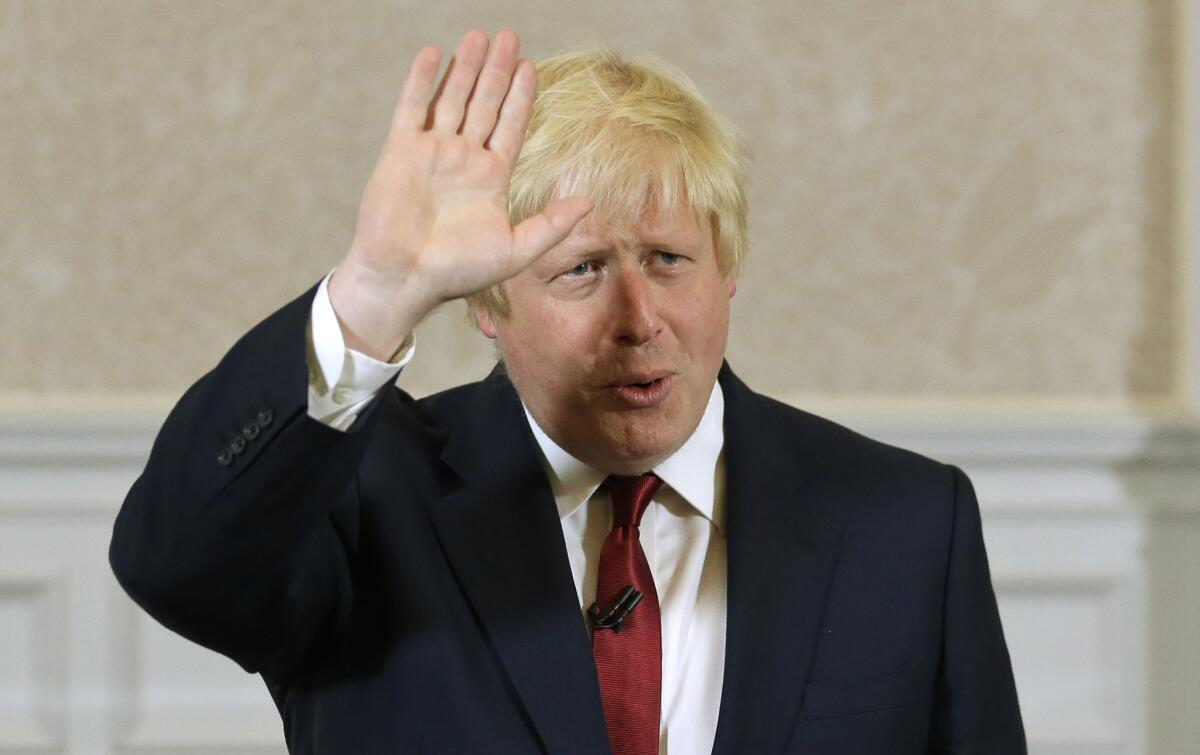‘Brexit’ campaigner Boris Johnson withdraws from race to become Britain’s prime minister

Reporting from LONDON — Throwing a chaos-weary British public another political curve, former London Mayor Boris Johnson abruptly withdrew Thursday from the race to become the next Conservative Party leader and British prime minister — a race in which until recently he was considered the front-runner.
Johnson’s announcement, delivered to an audience of journalists and party supporters that expected to hear the formal announcement of his candidacy, shocked the political establishment.
I must tell you, my friends ... that having consulted colleagues and in view of the circumstances in Parliament, that person cannot be me.
— Boris Johnson quits race to become prime minister
But it followed another surprising twist in the political saga that has engrossed Britons since last Thursday’s unexpected referendum vote for the country to leave the European Union: Justice Minister Michael Gove, who had been expected to support Johnson’s candidacy and even run on a joint ticket, instead launched his own run for the leadership with an acid attack on Johnson’s abilities.
“I have come, reluctantly, to the conclusion that Boris cannot provide the leadership or build the team for the task ahead,” he said.
Three hours later, and just minutes before the deadline for tossing his hat in the ring, Johnson withdrew.
Johnson’s announcement had politicians and commentators questioning his motives and motivations. There were reports that party allies had been warning him that his quest for the leadership would not be as uncomplicated as it had seemed immediately after his victory as leader of the successful referendum campaign.
Michael Heseltine, a Conservative Party fixture since the government of Margaret Thatcher, lit into Johnson in an interview with the BBC, saying that Johnson’s withdrawal and his role in the campaign to remove Britain from the European Union created a “profound sense of dismay and, frankly, contempt” in the party.
“He’s ripped the party apart,” Heseltine said. “He’s like a general that led his army to the sound of the guns and at the sight of the battlefield abandoned the field . … He must live with the shame of what he’s done.”
The turmoil raises new doubts about when — or even whether — Britain will start the formal process for withdrawing from the European Union. Under EU rules, only Britain can start the so-called Article 50 process, during which two years of negotiations for the divorce would take place. Last Thursday’s “Brexit” referendum was only advisory, and it’s unclear how likely it is that Parliament, which heavily favors continued ties with Europe, would ignore the popular vote.
The “leave” vote had been expected to usher in a period of economic and financial turmoil for Britain. But political turmoil has remained on the front burner while financial markets have calmed down. The benchmark FTSE 100 stock index, which had lost 355 points, or 5.6%, in the two days following the referendum, had since gained all of that back and then some through midday Thursday trading in London.

The Conservative Party’s Gilbert-and-Sullivan plots and counter-plots unfolded as parallel maneuvering roiled the leadership of the opposition Labor Party. Despite an overwhelming no-confidence vote Tuesday and the resignations of more than 50 members of his leadership team, Labor leader Jeremy Corbyn has vowed not to resign.
On Thursday, one of Corbyn’s chief adversaries, former Labor business spokeswoman Angela Eagle, said she was not yet ready to launch a formal leadership challenge, and would give Corbyn more time to step down of his own accord.
The colorful and voluble Johnson, 52, headed the Conservative Party’s Leave campaign, a position he was widely thought to have taken because of its potential to propel him to the prime ministership. Yet after scoring an unexpected triumph, he oddly had stayed secluded rather than seizing the limelight.
In his most extensive comment on the referendum vote, an op-ed in last Sunday’s Telegraph, he seemed to back away from the message delivered by voters. He called the 52-48 vote in favor of leaving the EU “not entirely overwhelming.”
Johnson’s appearance Thursday was similarly confounding. The setting was a news conference, which was widely presumed to have been called to announce his candidacy. He began in full candidacy-announcement mode, listing what he called “the agenda for the next prime minister of the country.” This included “to think globally again, to lift our eyes to the horizon, to bring our unique British voice and values — powerful, humane, aggressive — to the great global forums without being elbowed aside by a supranational body.”
With that swipe at the European Commission, he went on: “I must tell you, my friends, you who have waited faithfully for the punchline of this speech, that having consulted colleagues and in view of the circumstances in Parliament, that person cannot be me.”
Johnson’s withdrawal leaves two main contenders to succeed Prime Minister David Cameron, who supported staying in the EU and announced his resignation the day after the vote: Gove and Home Secretary Theresa May, who also announced her candidacy Thursday.
Gove, 48, a devoted campaigner for Brexit, is regarded as an intellectual heavyweight on the right wing of the Conservative Party but often maladroit as a public figure. The leftist journal New Statesman last year labeled Gove “the polite assassin,” describing him as “the politest man in politics and one of the most abrasive, a charmer who cultivates enemies. … His party isn’t sure if he is an asset or a liability.”
May, 59, is a well-respected technocrat who has served as home secretary — a pitfall-heavy post with responsibility for immigration, police in England and Wales and national security — since the beginning of the Cameron government in 2010, making her the longest-serving home secretary in more than a century.
Although May vigorously opposed withdrawal from the EU, she emerged as the favorite in the leadership race in opinion polls conducted by The Times.
In a news conference launching her candidacy, she also took a shot at Johnson: “Some need to be told that what the government does isn’t a game, it’s a serious business that has real consequences for people’s lives.”
She also pledged to honor the referendum vote. “Brexit means Brexit,” she said.
May said in her campaign launch that she would focus on relieving the economic stress felt by working-class Britons — a nod to a voting bloc that may have voted in large numbers to leave the EU, reflecting their doubts about the benefits of globalization.
“If you’re from an ordinary, working-class family, life is just much harder than many people in politics realize,” she said. “You can just about manage, but you worry about the cost of living and the quality of the local school, because there’s no other choice for you.”
The other announced candidates for the Conservative leadership are Work and Pensions Secretary Stephen Crabb, pro-Brexit Energy Minister Andrea Leadsom, and former Defense Secretary Liam Fox. The field will be narrowed to two by a committee of Conservative members of Parliament. Those two will then campaign among 250,000 party members, with a decision due in the first week of September.
Because the party still holds a majority in Parliament, the victor will become prime minister. Some political observers speculate, however, that the new prime minister might call a general election as early as October. Because Brexit is certain to be the major election issue, that would give voters a chance either to ratify the Brexit vote by a second poll, or overturn it by electing an anti-Brexit prime minster.
ALSO
In Britain, anxiety about immigration started long before the ‘Brexit’ vote
For thousands of Brits, France is home. But what happens after Brexit?
Turkey’s tourism and recreation industry struggles after months of terror attacks
UPDATES:
11:16 a.m.: This article has been updated with comments from Conservative Party fixture Michael Heseltine and other details.
9:35 a.m.: This article has been updated throughout with staff reporting, quotes and additional details.
This post was originally published at 4:23 a.m.
More to Read
Sign up for Essential California
The most important California stories and recommendations in your inbox every morning.
You may occasionally receive promotional content from the Los Angeles Times.











